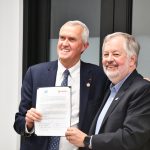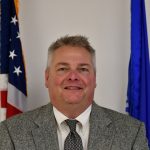Senator Baldwin Pushes Biden Administration to Bring Regional Tech Hub to Wisconsin
Baldwin-supported CHIPS and Science Act creates regional technology hubs to develop new technology, create jobs, and expand innovation
WASHINGTON, D.C. – U.S. Senator Tammy Baldwin is urging the Department of Commerce to select Wisconsin to house one of the Regional Technology and Innovation Hubs (Tech Hubs) created through the Baldwin-supported CHIPS and Science Act. As a member of the Senate Commerce Committee and Senate Appropriations Committee, Senator Baldwin worked to create the Tech Hub program and secure $500 million to drive technology- and innovation-centric growth and create good-paying jobs. The Tech Hub program was modeled off the Brookings Institute report that identified Wisconsin as the top destination for a regional hub.
“Wisconsin has strong potential to be a growth center because we have world-class research universities, a skilled Made in Wisconsin manufacturing workforce that knows how to make products, and the needed pipeline for the workforce of tomorrow,” said Senator Baldwin. “Wisconsin has been leading the world in cutting-edge research and technology and it has fostered several thriving industries because of it. I was proud to support the legislation to create these Tech Hubs because it will help train and educate the advanced manufacturing workforce of tomorrow and will spur economic growth, and I am going to fight to ensure Wisconsin will be at the center of that.”
Under the Tech Hubs program, the EDA will select where the Tech Hubs will be housed and award funding for strategy development, planning, and capacity building, as well as for implementation. However, prior to cities and states making formal applications, the EDA issued a Request for Information (RFI) to provide the agency input about the program design, structure, and selection process. To help position Wisconsin to house one of the Tech Hubs, Senator Baldwin responded to the RFI, outlining how the EDA can best implement the program to ensure success.
The full letter can be found here and or below.
The Honorable Alejandra Y. Castillo
Assistant Secretary of Commerce
Economic Development Administration
1401 Constitution Avenue, NW
Suite 71014
Washington, DC 20230
Dear Assistant Secretary Castillo,
I write in response to the Economic Development Agency’s (EDA) Request for Information (RFI) on Implementation of the Regional Technology and Innovation Hub Program, published in the Federal Register on February 14, 2023. The program was created with my support in the bipartisan CHIPS and Science Act, and was provided $500 million in funding in the Consolidated Appropriations Act of 2023.
As the Commerce Committee worked to craft its proposal, the program that took shape drew much of its inspiration from a Brookings Institute report that argued for spreading the benefits of technological innovation across the country. Currently, the significant economic benefits of tech innovation have been concentrated in five “superstar” metropolitan areas. Without intervention, these benefits will continue to compound (due to the nature of network effects in economic development) and draw capital and talent away from other regions.
In an effort to share the benefits of the innovation economy more broadly, the Brookings report identified mid-sized cities across the country that are actually well-positioned to develop into “growth centers” of their own. In the report’s rankings of regions with the most growth potential, four regions in the top 20 were from Wisconsin and number one overall was Madison. These regions scored the highest because they were most likely to develop into a self-sustaining innovation hub—provided that they receive a commitment of capital from the federal government to serve as the spark. These rankings make clear: Wisconsin would make an ideal location for a tech hub because it has genuine assets in research, industry, and workforce that have combined to form a foundation that—with the right public-private investment—could develop into something greater than the sum of its parts.
As EDA works to stand up the program, I want to take this opportunity to outline a few high level suggestions. First, I encourage you to fund at least six hubs with implementation grants of at least $50 million this year. These large investments will serve as magnets for additional capital, particularly in regions that have already demonstrated an ability to attract private funding.
Second, I encourage you to make one of your top criteria for evaluation of hubs the likelihood of success. While that may seem self-evident, overcoming the gravitational pull from the coastal superstar cities will be an incredible challenge. Successful hubs will likely already have a pull of their own that, with federal investment, can be catalyzed into a self-sustaining innovation hub. In order to ensure the new hubs can stand on their own, they have to be distant from the current superstar metropolitan areas, in order to ensure maximum geographic diversity in the national innovation ecosystem. Many members of Congress, myself included, worked hard to ensure that the Tech Hubs program would receive an appropriation in 2023 after passing the CHIPS and Science Act last year. The promise of geographical diversity inherent in the program was a key reason we were able to build support for the program’s funding. It would be a disappointment if the investment from an implementation grant did not deliver result in new hubs in the American heartland.
In closing, I appreciate your attention to my submission, which I hope will inform and guide your program design, structure, and evaluation. If you have further questions, please do not hesitate to contact my office.
An online version of this release can be found here.
NOTE: This press release was submitted to Urban Milwaukee and was not written by an Urban Milwaukee writer. While it is believed to be reliable, Urban Milwaukee does not guarantee its accuracy or completeness.
Mentioned in This Press Release
Recent Press Releases by U.S. Sen. Tammy Baldwin
Baldwin, Vance Bipartisan Bill to Ensure Taxpayer-Funded Inventions Are Made in America Passes Senate
Dec 4th, 2024 by U.S. Sen. Tammy BaldwinInvent Here, Make Here Act expands Baldwin-championed requirements to manufacture cutting-edge technologies in the U.S.
Baldwin Secures Big Wins for Wisconsin Agriculture and Rural Communities in Senate Farm Bill
Dec 3rd, 2024 by U.S. Sen. Tammy BaldwinBaldwin calls on Congress to pass five-year Farm Bill, give farmers, small businesses, and families certainty and support






















